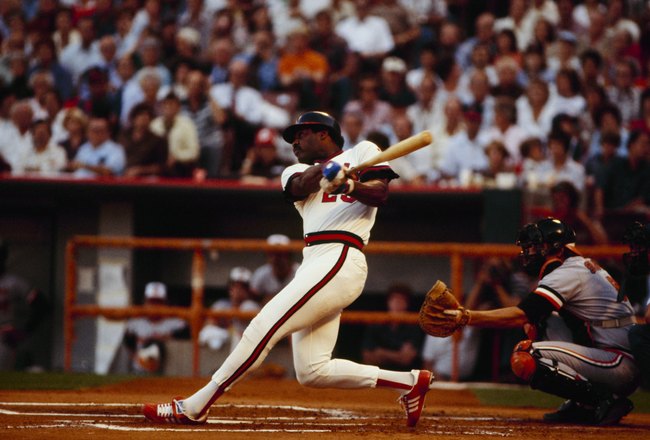
***
If there were ever a year a Angels player put it all together and led his team to the top, it would have to be Don Baylor’s 1979 season. Groove hit the ground running and never stopped. In April, a notoriously bad month for him, he got a league record 28 RBI’s. By August 12, he had the magical 100. Baylor’s hitting was infectious: Dan Ford, Brian Downing and Bobby Grich had a hundred RBIs as well. The team set records in runs scored with 866.
“Donny carried the whole team on his back,” claims Rod Carew. “He came through with the big clutch hits and home runs all year. He was the straw that stirred the drink.”
Adds Bobby Grich, “Everything he did in ’79 was about the team and winning. He was a quiet leader who never wavered. No matter who was on the mound, no matter what the situation was, he was just like a rock, a Texas rock.”
Baylor feels the season’s turning point was a big weekend sweep in July of the World Champion Yankees. After that a new spirit invigorated the Anaheim fans. “That series gave us credibility,” says Baylor. “That’s when the fans really started believing, and ‘Yes We Can!’ became our battle cry.”
The “Yes We Can!” chant started with a few isolated fans during the Yankee series and quickly evolved into a regular, roaring chorus of 40,00-plus.
“Yes We Can! Yes We Can!”
When the team was behind in the late innings, instead of fans reaching for their car keys and streaming to the parking lot, they would start the chant.
“Yes We Can! Yes We Can!”
Players who made an exceptional hit or a defensive gem got called out of the dugout for curtain calls and thunderous ovations. Suddenly, come-from-behind victories became regular occurrences.
By mid-summer 1979, the usually laid-back Anaheim Stadium had turned into party central. Baylor’s torrid hitting contributed to the din, and he kept it going, knocking out another 34 ribbies and carrying the team into the playoffs.
On September 25th, Frank Tanana got the Royals’ Darrell Porter to ground to Carew at first to clinch the Angels first Divisional Championship. The 18-year drought had officially ended and Autry had a winner.
In Game Two, the Orioles jumped out quickly for an early 9-1 lead. The Angels almost closed the gap but lost a heartbreaker, 9-8.
“We were out-talented in ’79. The Orioles had a better team and a better pitching,” Baylor admits. “Overall, they played better as a team. They got the hits when they needed them, and Earl Weaver pushed all the right buttons and it worked for ‘em. We were inexperienced and it showed.”
Baylor’s phenomenal 134 RBIs lead the majors. He had 36 homers and hit .294. He played in all 162 games, was named to the All-Star team and was American League “Player of the Month” twice. It was a stellar year for him, and the best offensive year in Angel history.
In November, Baylor went to Japan for an all-star tour of major league players. He had just returned to the States and was driving from the airport listening to Angels’ flagship station KMPC on radio when the announcer said he was dedicating the song “My Special Angel,” to Baylor, and predicted over the airwaves he was going to take MVP honors.
Later that afternoon, Baylor learned he had beat out the Orioles’ Ken Singleton for American League MVP honors – the first time an Angel had ever won the prestigious award. It wasn’t until Vladimer Guerrero won in 2004 that another Angel did it.
Buzzie Bavasi broke precedent when he requested that Baylor receive extra compensation as a reward for his feat. “I got Gene (Autry) to give him $50,000,” said Bavasi. “They all thought I was crazy. When I was with the Dodgers, if one of our players won the Cy Young award, all he got was a motion picture camera.”
© Once They Were Angels 2006, 2012 Robert Goldman
Add The Sports Daily to your Google News Feed!